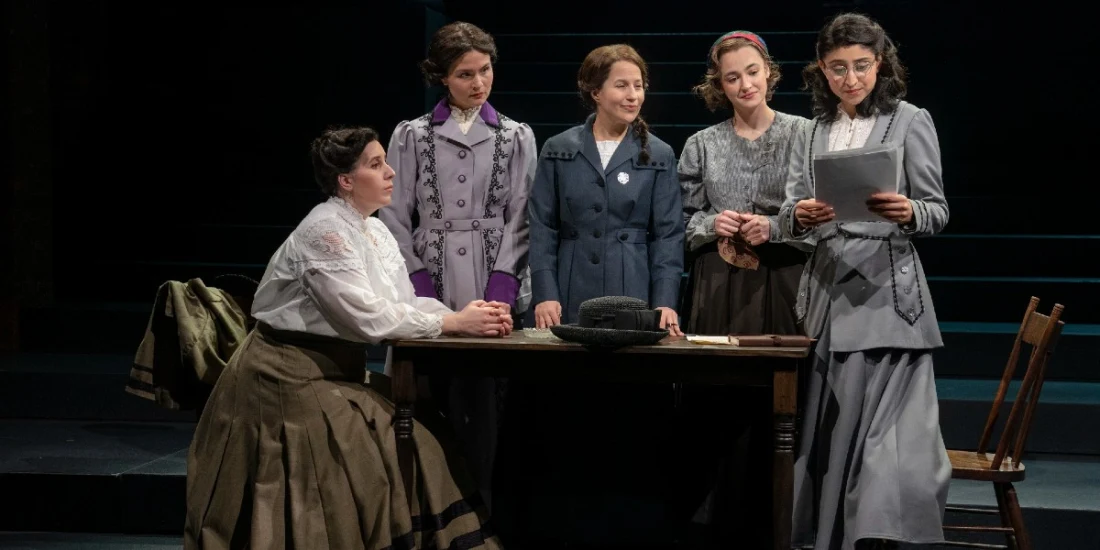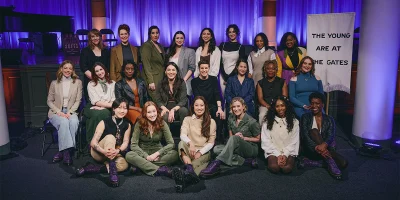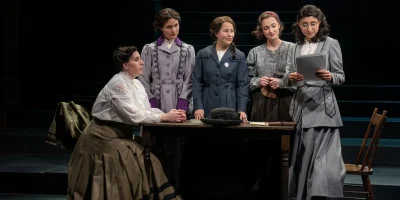
'Suffs' review — a historical and history-making musical
There's one moment in Suffs that will make you want to get up and raise your fist. It's early on in Act One, during a 1913 protest where over 5,000 women, wearing white, marched on Washington to demand the right to vote. In real life, suffragist and lawyer Inez Milholland led the procession astride a white horse, wearing a crown and cape. Suffs impressively recreates that moment, with the powerful Phillipa Soo coming out on a full-size replica of a horse as she sings "women of the country" as high and clear as a bell. It's a chest-thumping moment that shows what Suffs is capable of in its best moments.
Suffs is the mostly sung-through new musical by Shaina Taub, who created the musical versions of Twelfth Night and As You Like It for Shakespeare in the Park. Suffs is Taub's first large musical and tells the story of the decades-long fight for the 19th Amendment, which gave women the right to vote.
It's an impressive achievement. Taub wrote the book and the songs and stars as Alice Paul, the National Women's Party leader who helped organize that 1913 suffrage parade. The story primarily follows Alice as she encourages her fellow suffragists to do more publicly disruptive political actions, butts heads with the older generation of suffragists, and compromises the movement for equality by prioritizing white women over Black women.
It's a complex undertaking, with a lot of behind-the-scenes strategizing and infighting to dramatize. Taub and the Suffs team mostly succeed, though at times, the musical feels like a history lesson.
After that 1913 march, which comes about half an hour into Act One (Suffs clocks in at 2 hours and 45 minutes), Suffs loses its narrative momentum. Act One then dramatizes the conversations with President Woodrow Wilson, the forming of the National Women's Party, the campaign against Wilson's reelection, and the death of a suffragist. Because Taub musicalizes multiple protests, each subsequent rallying cry takes on a certain monotony. By the end of Act One, when the suffragists hold the first public protest in history at the White House, the emotional and historical impact is lost.
The benefit of doing a musical instead of a play is that music can be used as a shorthand, to make audiences emotionally connect to characters without needing to know their entire life story. Unfortunately, aside from Alice's catchy "I want" song, where she sings that she will "be the one to finish the fight, the fight for equality," the other characters' songs are mostly musicalized biographies, all verses and no chorus.
In one scene, Soo's Inez asks Taub's Alice if they can talk about something other than suffrage. This seemed like a moment to get to know each woman on a deeper level. Instead, the characters discuss their next protests. It's a missed opportunity to show the humanity behind the women doing the work and get the audience emotionally invested in them as people, rather than as characters in a history book. Even Hamilton, which is similarly character-filled and narratively dense, gives time to drinking songs and lets the characters "wait for it."
The cast of Suffs is sprawling, with 19 actors, all femme-identifying, who play suffragists as well as men. Under Leigh Silverman's expert direction, the women give virtuosic and energetic performances — in one group number, they simultaneously play the female suffragists and the men who harass them. Under less sensitive hands, these gender-bending moments could be played for laughs, but Silverman gives them the necessary menace while giving the cast room to vamp (Grace McLean, as Woodrow Wilson, is a particularly skilled scene chewer).
The many Broadway powerhouses in the cast, such as Nikki M. James as Ida B. Wells and Jenn Colella as Carrie Chapman Catt, navigate their dense songs with skill. Aside from Alice, they have limited time to make an impression. But it's the stage presence of those women, such as the slight swagger in the way that James's Ida walks, that ensures that the characters stay in your mind even when they're not on stage.
The second act of Suffs is less dense and more narratively focused than the first, and the ending is masterful. Considering that women's rights and voting rights continue to be undermined, it would be disingenuous for Suffs to end on a note of victory. Taub smartly ends her musical with enough satisfying closure while leaving the story open.
In entertainment, there is the assumption that women's stories are small, while men's stories are universal. Just as the suffragists broke down the doors of the patriarchy, Suffs breaks down the doors of musical theatre, showing that a cast and creative team of mostly women can tell a story that is important, powerful, and about all of us. With Taub leading it, the future of musical theatre is female, and it's about time.
Suffs is at The Public Theater through May 15. Get Suffs tickets on New York Theatre Guide.
Photo credit: Ally Bonino, Phillipa Soo, Shaina Taub, Hannah Cruz, and Nadia Dandashi in Suffs. (Photo credit: Joan Marcus)
Frequently asked questions
What is Suffs about?
See a historical, history-making original musical as it marches onto Broadway. Suffs details the lives and legacies of the pioneers of the women's suffrage movement, taking a celebratory but honest look at their triumphs and imperfections alike.
Where is Suffs playing?
Suffs is playing at Music Box Theatre. The theatre is located at 239 West 45th Street (between Broadway and 8th Avenue), New York, 10036.
How long is Suffs?
The running time of Suffs is 2hr 30min. Incl. 15min intermission.
What's the age requirement for Suffs?
The recommended age for Suffs is Ages 10+. Children under 4 are not allowed in the theatre..
How do you book tickets for Suffs?
Book tickets for Suffs on New York Theatre Guide.
Who wrote Suffs?
Shaina Taub wrote the book, music, and lyrics for Suffs. She is also known for co-writing The Devil Wears Prada musical with Elton John and adapting multiple Shakespeare plays into musicals for The Public Theater.
Who directed Suffs on Broadway?
Tony Award nominee Leigh Silverman (Violet) is the director of Suffs. She directed the musical both on and off Broadway.
What are the songs in Suffs?
The score for Suffs, written entirely by Shaina Taub, features songs with titles including "The Young Are At the Gates," "The Strong One," "Ladies," "This Girl," and "How Long."
Is Suffs appropriate for kids?
Suffs on Broadway has not yet set an age recommendation. Please note that children 4 and younger are not permitted in Broadway theatres.
Is Suffs good?
Suffs is among the best-reviewed shows on New York Theatre Guide, with our four-star review of the play's Off-Broadway premiere hailing it as "a historical and history-making musical... the future of musical theatre is female, and it's about time."
Originally published on









